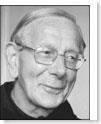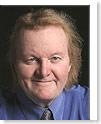I finally had the sense to pick up Father Joe. The book had been in my “to read” pile for more than a year. Father Joe: The Man Who Saved My Soul is a memoir of sorts. It’s a story about a seemingly unlikely relationship between the author Tony Hendra and a religious.
The book begins with the fourteen-year-old Tony who finds himself entangled with a married Catholic woman. When the husband, a sincere-to-a-fault Catholic, discovers the tryst, he whisks the boy off to get straightened out by a priest. The priest he meets is a gentle, stammering, quirky, and wise Benedictine monk named Father Joseph Warrillow. The monk is nothing like what he imagined and a bond develops between them.
 So taken is Hendra with Father Joe that upon graduating from high school he is intent on joining the Benedictine community. However, Father Joe’s deeper wisdom is that he wait. Then in one of the more fascinating moments in the book, Hendra describes losing his faith, as if over night. The remainder of the book is a description of an alternately sinking and surfacing life. Hendra slides into substance abuse, goes through a ruined marriage, but the one anchor in his life is the non-judgemental Father Joe. It’s this relationship that, in the most practical sense, saves the author.
So taken is Hendra with Father Joe that upon graduating from high school he is intent on joining the Benedictine community. However, Father Joe’s deeper wisdom is that he wait. Then in one of the more fascinating moments in the book, Hendra describes losing his faith, as if over night. The remainder of the book is a description of an alternately sinking and surfacing life. Hendra slides into substance abuse, goes through a ruined marriage, but the one anchor in his life is the non-judgemental Father Joe. It’s this relationship that, in the most practical sense, saves the author.
At every level it’s a wonderful story, but it might also be worth mentioning that  Tony Hendra, while attending Cambridge, performed frequently with his friends and Monty Pythons-to-be, John Cleese and Graham Chapman. He was editor in chief of Spy magazine, and the original editor of National Lampoon. He also played Ian Faith in the movie, This Is Spinal Tap, and was the co-creator of Spitting Image. He has written frequently for New York, Harper’s, Vanity Fair, among other magazines.
Tony Hendra, while attending Cambridge, performed frequently with his friends and Monty Pythons-to-be, John Cleese and Graham Chapman. He was editor in chief of Spy magazine, and the original editor of National Lampoon. He also played Ian Faith in the movie, This Is Spinal Tap, and was the co-creator of Spitting Image. He has written frequently for New York, Harper’s, Vanity Fair, among other magazines.
—
The bad news: Just after I wrote this little review I learned that the “delinquency” of Hendra may have gone far deeper than the memoir divulged. When the book was published, Jesscia Henda, 39 at the time, “unable to bear the hypocrisy,” wrote that she had been sexually molested by her father when she was seven and that it happen two more times after that. The charges are denied by Hendra but the New York Times article, to my mind, seems credible.
So what do you do with a non-fiction memoir you profoundly enjoyed only to find that the author may have committed one of the most grievous and damaging of crimes?
What saves the book is that while it’s ostensibly about Tony Hendra, it is more properly about Father Joe, the joyful, generous, wise monk, who had the kind of presence that could save one from religious cynicism. In fact at the end of the book we learn of the immense impact this humble Benedictine monk had on hundreds of people, including Rowan Williams, currently the archbishop of Canterbury, and Princess Diana.
